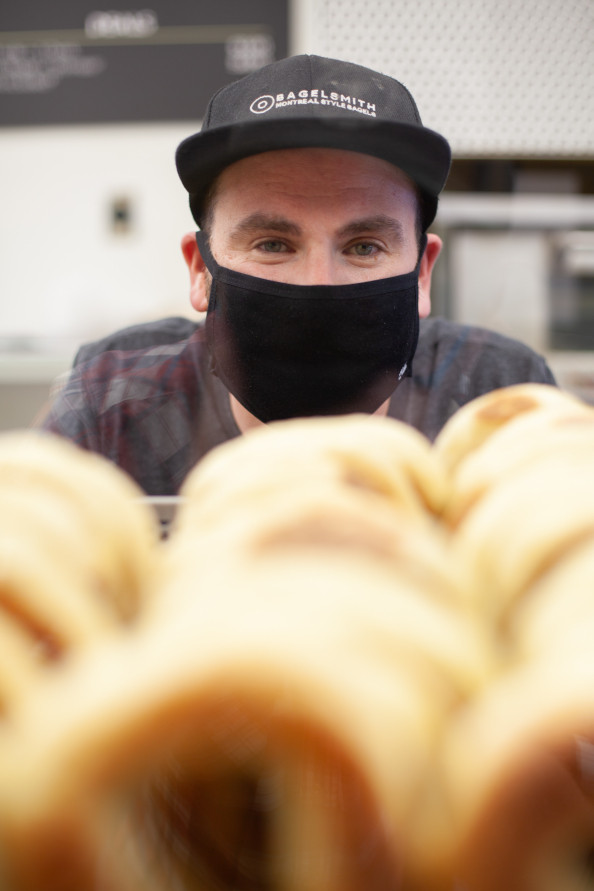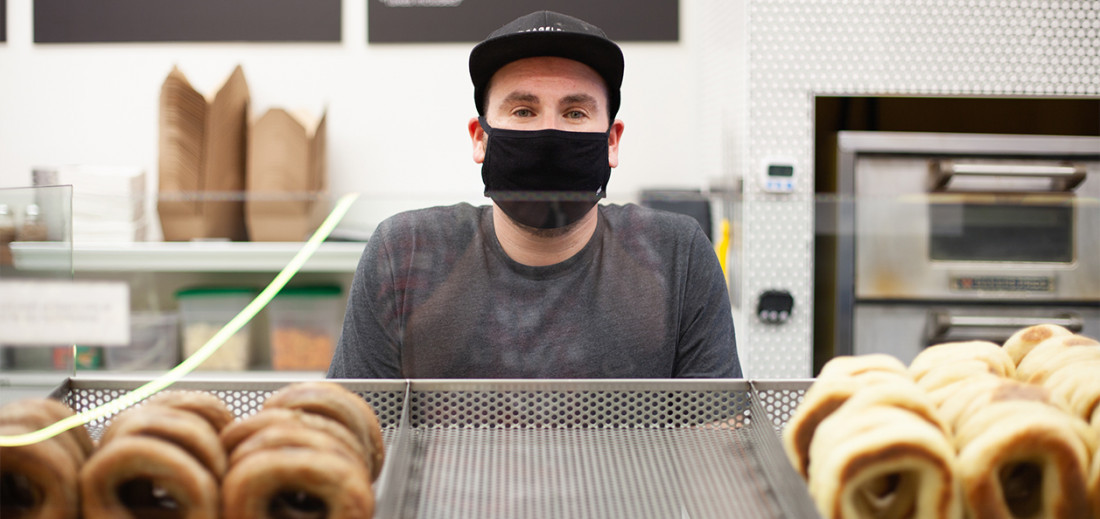Empty towers
Remote work, small businesses and the future of downtown Winnipeg
Working from home has its perks. Sweatpants, new pets and sleep-ins are certainly appreciated by workers. For small businesses downtown, however, the lack of office workers due to the ongoing COVID-19 pandemic has been economically devastating and has accelerated some negative trends that existed prior to 2020.
Major employers, schools and business establishments have been shut down. For example, the University of Winnipeg, which has more than 10,000 employees and students, has operated almost entirely online since March 2020 (with a partial return to in-person classes this month).
The Canada Life Centre, which usually attracts more than 15,000 people for Winnipeg Jets games and concerts, has been closed since the beginning of the pandemic. Perhaps a symbol of downtown’s decline, the historic Hudson’s Bay Company store on Portage Avenue permanently closed in late 2020.
Since downtown Winnipeg is home to 70 per cent of all office space in the city, office workers were extremely important for the region’s economic success and cultural vibrancy. This cannot be overstated, especially since there are few people who live in the area. In fact, only 2.3 per cent of Winnipeggers live downtown. This is much smaller than in Canadian cities like Ottawa (6.4 per cent), Toronto (8.4 per cent) and Vancouver (17.2 per cent).

“That regular lunch-hour and after-work crowd has been a real loss over the course of the pandemic ... ground-floor businesses have definitely had to work very hard to find new streams of revenue.” - David Pensato, executive director of Exchange District BIZ (Supplied)
Business forced to adapt
One strategy to deal with a lack of customers has been adopted by businesses with multiple locations.
Thom Bargen, the Winnipeg coffee shop, has temporarily closed its downtown locations at 365 Main St. and 250 Kennedy St. This allowed them to consolidate their business at their Sherbrook Street location.
The Second Cup located across from Manitoba Hydro on Edmonton Street has temporarily closed. This likely has something to do with the thousands of Manitoba Hydro employees who have been working from home.
Downtown small businesses with only a single location, however, do not have that flexibility and have faced a variety of challenges during this period.
David Pensato, executive director of the Exchange District BIZ, says the pandemic’s impact has been significant on his part of downtown. The Exchange District is an area characterized by a “collection of heritage buildings” and “local restaurants, boutique shops, art galleries, museums and attractions.”
“We got hit doubly, because we lost the office workers, and we lost those summer events and tourists,” Pensato says. Cultural events like the Winnipeg Fringe Theatre Festival and the TD Winnipeg International Jazz Festival play a large role in attracting people to the area in a typical year.
The impact of office employees working from home has also been quite noticeable, Pensato says.
“That regular lunch-hour and after-work crowd has been a real loss over the course of the pandemic,” he says, adding that the “groundfloor businesses have definitely had to work very hard to find new streams of revenue and new methods of delivery.” This has included offering curbside pickup and selling their products at grocery stores.
Absence of office workers leaves hole in bagel shop
Phil Klein, the owner of Bagelsmith, says it has been an “exhausting experience to operate during a pandemic.” In fact, this Montreal-style bagel shop has only ever known doing business in the world of COVID-19.
“We signed our lease the day before the pandemic,” Klein says. He adds that it was a challenge to find a location. “Being a startup with no track record of owning a restaurant, landlords don’t typically want to work with you.”
Ultimately, Bagelsmith opened in October 2020 at 185 Carlton St. Klein says he’s happy with the location due to the number of office workers nearby ... someday.
“Unfortunately, we didn’t get to capitalize on that just yet,” he says, referring to the fact that many people are still working from home.
“I would love for everyone to come back to work, but I also recognize, practically, that it’s just not wise,” Klein says. “People need to follow the rules, and government needs to keep the restrictions in place until we see where we’re at with the fourth wave.
“I’d rather lock stuff down more and keep restrictions in place and get through this already, so we can have some normalcy.”
Other challenges Bagelsmith has faced include erratic traffic trends and staffing difficulties. This latter problem has, in fact, affected employers across Canada and is a key factor that might slow the country’s economic recovery, according to the Business Development Bank of Canada.
Despite these issues, Klein says “support from across the city” has allowed Bagelsmith to be quite busy. “It’s been a (hectic) time, but I’ve been very lucky,” he says.
Pensato echoes this sentiment.
“There’s a real sense of community here, so when our businesses pivoted (to online operations), (patrons) were tremendously supported by the community that is normally here in person,” he says.
“As we weather the storm, hopefully things will pick up organically,” Klein says.

“I would love for everyone to come back to work, but I also recognize, practically, that it’s just not wise.” - Phil Klein, Bagelsmith owner
Bookstore hopes dark chapter will soon be over
Well-established businesses have also been struggling with the lack of people downtown. Book Fair, which sells comics and used books, has been around since 1978. Owner Judy Weselowski says they may be forced to shut down if things don’t pick up.
“All the office people are working from home, so we don’t have our regular clientele to buy used books,” she says, adding that it’s “a real struggle.”
“Everyone wants to sell (us) their books and get cash, but we want to get money in to pay rent,” Weselowski says.
The lack of customers has forced them to make difficult decisions. “I had to lay off a worker, and we just don’t have enough business to bring the worker back,” she says.
Weselowski believes it’s not just a lack of workers downtown that is hurting businesses like hers. She says the general public might be scared of coming downtown, and many “just don’t feel it’s safe anymore.”
“We’ve had people from out of town coming in the last couple of weeks and saying ‘oh, it’s really rough downtown,” Weselowski says.
A recent report entitled “State of Downtown: The impact of the pandemic to date” prepared by the Downtown Winnipeg BIZ noted that, though crime rates dropped during the pandemic, “signs of poverty, mental illness and drug use may have become more visible in the city centre.”
“Perception that downtown is unsafe could be fueled in part by widespread social stigma surrounding homelessness, mental health and substance use,” the report notes.
Concerns about COVID-19 might also be at the top of patrons’ minds. To make their store more welcoming, Book Fair has implemented safety protocols to ensure a good shopping experience for customers.
“We work on an ‘open-on-demand’ (model) instead of keeping our door unlocked, because we’re basically the only retail on our block right now,” Weselowski says. “We know who’s coming in. We do contact tracing, so it just makes it easier that way.”
Weselowski points to a decline in retail stores downtown, which has long preceded the pandemic, as a key concern for the stores that remain.
“Unless you can fill up the storefronts on Portage (Avenue), you’re not getting people coming downtown,” she says.
One potential revitalizer is the redevelopment of the Portage Place mall “into a new mixed-use complex with retail and office spaces,” scheduled to start later this year. The Retail Insight Network reports that this project has an estimated economic impact of almost $700 million and could “generate 3,343 years of employment.” However, many have expressed concerns about this project, given that the lead company, Starlight Investments, has a poor track record with its other developments across Canada.

Downtown is home to 70 per cent of Winnipeg’s office space, but only 2.3 per cent of Winnipeggers live there. The decrease in people during the pandemic has been hard on downtown businesses.
‘Patterns are unpredictable’
Pensato notes there are reasons to be hopeful, though the uncertainty of the COVID-19 situation remains difficult for businesses.
“We’ve seen some office workers coming back in the last two, three weeks – certainly the restaurants are noticing that – but what’s happening is that the patterns are unpredictable,” Pensato says.
“It’s very hard to staff appropriately when you don’t know what the patterns are going to be,” he says, adding that the only pattern they know is one of “waiting and seeing.”
“We are waiting to see to what degree office workers return in the fall, how often they’re coming in,” Pensato says.
The concern about whether this remote work is temporary or permanent lingers, though he believes this is slightly overblown by the media.
A survey released in April 2021 revealed that most Canadians are still hesitant to return entirely to in-person work. Only 9 per cent of respondents said their preference was to work all hours outside the home. 40.8 per cent voted for an evenly split hybrid model, while almost 40 per cent still prefer to work most or all hours at home.
“We have to wait and see when the dust settles,” Pensato says. “I think the main thing is that we need to keep that going: support your community and support these businesses.”
Bagelsmith is open Monday to Saturday from 8:30 a.m. to 4:30 p.m. and is located at 185 Carlton St. Book Fair is open Monday to Saturday from 10 a.m. to 5 p.m. and is located at 340 Portage Ave.
Published in Volume 76, Number 3 of The Uniter (September 23, 2021)







